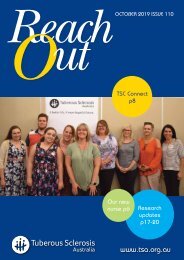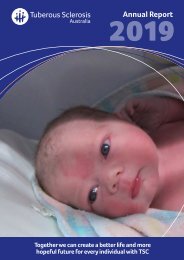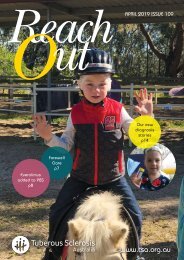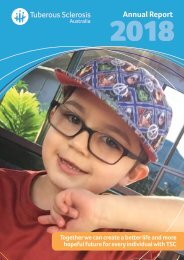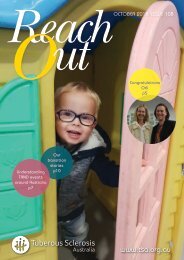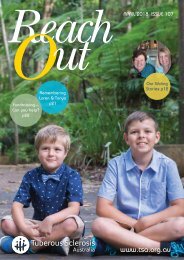ATSS_ReachOut_April17_FINAL
You also want an ePaper? Increase the reach of your titles
YUMPU automatically turns print PDFs into web optimized ePapers that Google loves.
Information<br />
Research Highlights from TSC<br />
International Conference in Lisbon<br />
Congratulations to the Associação de Esclerose Tuberosa<br />
em Portugal for hosting an inspiring and collaborative<br />
meeting between researchers, clinicians, advocates, people with<br />
TSC and their families. Clare Stuart, TSA’s General Manager<br />
and co-chair of TSC International, attended the meeting and<br />
was the only Australian representative.<br />
This article summarises some of the research themes explored<br />
at the conference. For more information about a particular<br />
research project please contact us. We can direct you to further<br />
information or introduce you to the researchers involved. Like all<br />
the TSC information we provide, this article does not constitute<br />
medical advice and you should not take any action before<br />
speaking with your health care professional.<br />
Understanding the TSC Brain<br />
Several projects were presented that increased our knowledge in<br />
this area, including the genetics that drives the development of<br />
TSC tumours and tubers in the brain, how seizures and epilepsy<br />
arise in a TSC brain and new technologies that can be used to<br />
better visualise the TSC brain.<br />
Other talks at the conference identified the challenges and<br />
opportunities posed by new and emerging imaging technologies.<br />
There was also emphasis on the importance of the TSC<br />
community working with radiologists and starting to consider<br />
imaging as a consultation, not just a commodity.<br />
Early detection and prevention of autism<br />
Up to 50% of people with TSC will develop autism and, for many,<br />
this has a significant impact on their quality of life. However,<br />
research on mice with TSC suggests that there may be a role for<br />
very early intervention to prevent autism. Other work suggested<br />
that there may be later opportunities for intervention for social<br />
aspects of autism, but less so for features of autism related to<br />
repetition and inflexibility. Like all research in mice models,<br />
there is a lot of work to do to test this idea before we know if it is<br />
useful in people.<br />
In other aspects of TAND (*), researchers described the<br />
“overwhelming uniqueness” they have discovered and the work<br />
they are doing to identify clusters of TAND-related symptoms and<br />
how this could be used to better target mental health interventions.<br />
Advances in genetics<br />
Further work has been done to understand the group of people<br />
with definite TSC who do not seem to have a gene change on<br />
either the TSC1 or TSC2 gene. Studies continue to show that a<br />
large proportion of this group are eventually found to be mosaic,<br />
meaning that only some of their cells have the TSC1 or TSC2 gene<br />
change. For others, researchers have found that newer, “deeper”,<br />
genetic sequencing technologies may be able to identify gene<br />
changes in this group.<br />
Work on non-invasive pre-natal testing continues and<br />
it is reasonable to expect this technology to be available for<br />
prospective parents with TSC within the next ten years.<br />
TSC International representatives,<br />
including Clare Stuart from TSA,<br />
at the conference<br />
The path to new treatments, improved care and a<br />
better quality of life for people with TSC<br />
The results of the EXIST-3 clinical trial of using mTOR inhibitor<br />
medicine to treat medication-resistant epilepsy were discussed.<br />
The trial results suggest that a relatively high dose of mTOR<br />
inhibitors is required to have a noticeable effect on seizures for<br />
most people and that more work needs to be done to identify<br />
subgroups of people with TSC who have the most to gain from<br />
this potential new epilepsy treatment.<br />
A recurrent theme of the meeting was improving care for<br />
people with TSC throughout the world. TSC International hosted<br />
a specific workshop on this topic with representatives from<br />
diverse countries sharing experiences and challenges. There was<br />
wide recognition that, as a global TSC community, we have some<br />
responsibility for closing the gap between the health care available<br />
to those in high income countries with access to TSC centres of<br />
excellence and those who do not have these resources.<br />
Basic science work, the hardest to explain in a brief article like<br />
this one, continues to improve our understanding of how cells<br />
with TSC behave and why they cause the signs and symptoms of<br />
TSC throughout the body. Several exciting projects are in progress<br />
and we can be optimistic that TSC research will continue to<br />
push all of us forward to improve the lives of people with TSC<br />
throughout the world.<br />
* TAND stands for TSC Associated Neuropsychiatric Disorders<br />
and includes behaviour, cognition and psychiatric aspects of TSC<br />
such as sleep difficulties, learning difficulties and autism.<br />
21


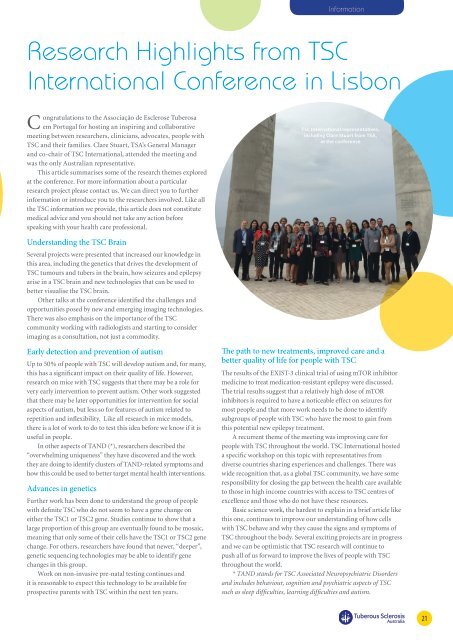


![TSA Reach Out April 2022 [Final]](https://documents.yumpu.com/000/066/687/587/3d369bd665bdb406a759500f62e2cfad0ccb7b3d/47512b4a703265727550565249426664566a727454513d3d/396a524e7354316d3867454b587243526164724c52673d3d.jpg?AWSAccessKeyId=AKIAICNEWSPSEKTJ5M3Q&Expires=1716004800&Signature=ThQW0OK25Pk4hGxt8PEYINJt60k%3D)
![TSA AR 2021 [WEB] (1)_FINAL](https://documents.yumpu.com/000/065/886/431/1afb21934ac6c444cd384e5fd7403d62e47080ce/426853747566526573646568546777594b4a4a5734513d3d/547274595943503850786275754544495972536c52513d3d.jpg?AWSAccessKeyId=AKIAICNEWSPSEKTJ5M3Q&Expires=1716004800&Signature=6cG7TA2TlqjtTc4AD3eulEdYmGw%3D)

![TSA Reach Out Apr 2021 [WEB]](https://documents.yumpu.com/000/065/442/909/1e583cb2acba0eaa7f1aae53e14a0cf408aa56c4/7871796d694459464d707163324830746459484671673d3d/45356637637a3369494f764f4c3858495549795251513d3d.jpg?AWSAccessKeyId=AKIAICNEWSPSEKTJ5M3Q&Expires=1716004800&Signature=%2FReb%2FxCqLk%2F0AnAU6seQNb9n76M%3D)




